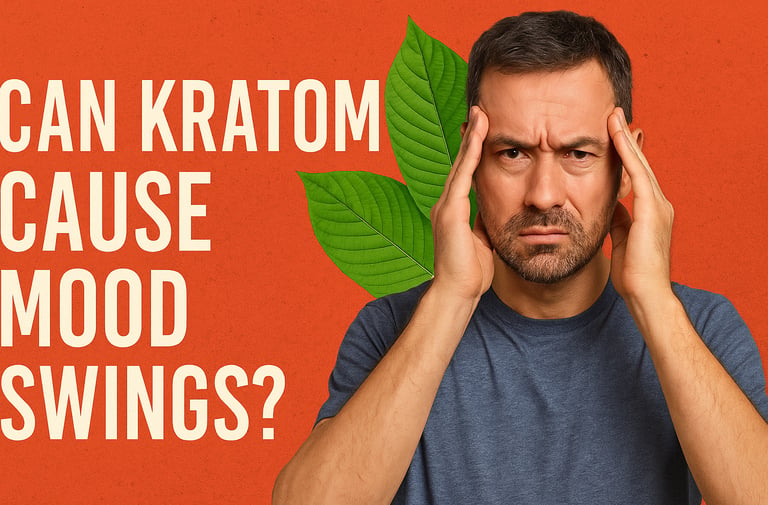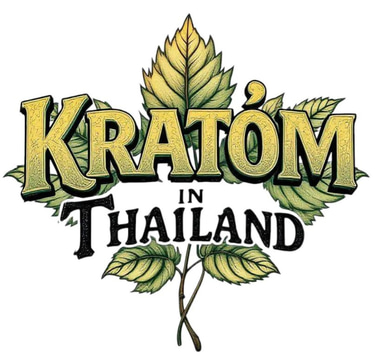High quality - Fast Delivery - Easy payment
Can Kratom Cause Mood Swings?
This article explores the connection between kratom and mood swings, offering science-backed insights, personal tips, and safe-use recommendations. #kratom mood swings, kratom emotional effects, kratom side effects, kratom and mood, kratom mitragynine, kratom safety
6/30/20254 min read


Can Kratom Cause Mood Swings? Here’s What the Science (and Real Users) Say
Kratom, a tropical leaf native to Southeast Asia, has quickly made a name for itself in wellness communities around the globe. Known for its unique alkaloid profile and stimulating or relaxing effects depending on the dose, kratom is used for everything from boosting energy to promoting calm. But a common question among curious newcomers and long-time users alike is:
Can kratom cause mood swings?
In this article, we explore the science, real-world experiences, and practical strategies to help you better understand the emotional effects of kratom. Whether you're just starting out or looking to deepen your knowledge, you’ll come away with useful insights and safe-use tips.
What Is Kratom, and How Does It Work?
Kratom (Mitragyna speciosa) is a plant from the coffee family. It’s been traditionally used in Thailand, Malaysia, and Indonesia for hundreds of years by farmers and laborers looking to enhance stamina or unwind after work.
The key to kratom’s effects lies in its alkaloids, primarily:
Mitragynine – the most abundant alkaloid, known for its stimulating properties at lower doses and relaxing effects at higher doses.
7-Hydroxymitragynine – a more potent compound linked to pain relief and calming effects.
These alkaloids interact with the opioid receptors in the brain, but kratom is not an opioid. Instead, it acts as a partial agonist, which means it stimulates these receptors to a lesser extent, offering some relief or mood alteration without the intense effects of traditional opioids.
Can Kratom Cause Mood Swings?
The Short Answer: Yes—In Some Cases
Just like coffee, alcohol, or other natural substances that influence brain chemistry, kratom can affect mood. Whether it helps stabilize your emotions or leads to mood swings depends on several factors:
Dosage
Strain (e.g., red, green, or white vein)
Frequency of use
Individual sensitivity
Underlying mental health conditions
Reported Mood-Related Effects (Based on User Experiences)
Positive Emotional Effects (especially at lower doses):
Elevated mood
Improved motivation
Increased sociability
Reduced anxiety
Negative Mood Effects (usually from frequent or high doses):
Irritability
Emotional blunting
Anxiety or restlessness
Mood swings or emotional crashes when the effects wear off
Scientific Support: What Research Says
While clinical research on kratom is still emerging, there are some peer-reviewed studies and expert reviews that support the connection between kratom and emotional changes:
A 2018 review published in Drug and Alcohol Dependence found that users often report improved mood and reduced anxiety with moderate kratom use, but also noted risks of dependency and withdrawal-related mood swings with long-term, high-dose use .
In a 2017 online survey of over 8,000 kratom users, 51% reported improved mood, while a smaller number reported mood disturbances during withdrawal or inconsistent use .
A 2020 study in the Journal of Psychoactive Drugs found that kratom users may experience mild withdrawal symptoms, including irritability and mood instability, especially after prolonged daily use .
Real Talk: Personal Stories from Kratom Users
“When I first started using green kratom in the mornings, it helped me kick my caffeine habit and gave me a steady energy boost. I felt lighter emotionally and more focused. But when I started upping the dose and taking it every evening too, I noticed I’d feel low or irritated if I skipped a dose.” — Jason, 34, freelance designer
“Red vein kratom really helped calm my anxiety. But when I used it too often, it started messing with my emotions—like I'd be super happy one hour, and then kind of zoned out or cranky the next.” — Lina, 29, yoga instructor
How to Use Kratom Safely and Avoid Mood Swings
If you’re considering kratom, or already using it and worried about emotional fluctuations, here are practical tips to help you avoid mood-related issues:
Use the Lowest Effective Dose
Start small and assess how your body responds. Most users report good effects between 2–4 grams.
Choose the Right Strain
Green vein: Balanced, good for mood and energy.
Red vein: Relaxing and calming.
White vein: More stimulating; may be too energizing for sensitive individuals.
Avoid Daily Use
Frequent use can lead to tolerance and emotional dependency. Stick to 2–3 times a week if possible.
Stay Hydrated and Eat Well
Kratom can dehydrate you, and poor hydration can affect your mood. A good diet helps too.
Cycle Off Regularly
Take breaks every few weeks to reset your receptors and emotional balance.
When to Be Cautious
Kratom is not for everyone. Avoid or use with caution if you:
Have a history of bipolar disorder or mood instability
Are taking antidepressants or mood-altering medications
Are prone to emotional highs and lows
Experience withdrawal-like symptoms or mood crashes after using
If you notice mood swings that interfere with your daily life, it may be worth scaling back or stopping use and speaking with a healthcare provider who understands herbal supplements.
Conclusion: The Bottom Line on Kratom and Mood Swings
Yes, kratom can cause mood swings, especially if used frequently, at high doses, or without proper awareness. But for many users, it can also be a tool for enhancing mood, reducing anxiety, and supporting focus—when used responsibly.
As with any botanical substance, the key is balance, awareness, and listening to your body.
💬 Curious to learn more about safe kratom use and its potential benefits? Explore our other blog posts or sign up for updates from trusted kratom experts.
References
Swogger, M. T., & Walsh, Z. (2018). Kratom use and mental health: A review. Drug and Alcohol Dependence, 183, 134–140. https://doi.org/10.1016/j.drugalcdep.2017.10.012
Grundmann, O. (2017). Patterns of Kratom use and health impact in the US: Results from an online survey. Drug and Alcohol Dependence, 176, 63–70. https://doi.org/10.1016/j.drugalcdep.2017.03.007
Smith, K. E., & Lawson, T. (2020). Prevalence and characteristics of kratom use, and the association with substance use disorders in the United States. Journal of Psychoactive Drugs, 52(3), 273–281. https://doi.org/10.1080/02791072.2020.1767321
Terms & Conditions
No sales are permitted to individuals under the age of 18, pregnant women, or those who are breastfeeding. Our products are sold strictly for research purposes only and have not been evaluated by the Food and Drug Administration (FDA) and are not intended to diagnose, treat, cure, or prevent any disease. By placing an order, you acknowledge that you have read, understood, and agreed to these Terms & Conditions. Do not order if you do not agree to these Terms & Conditions.
Contact
info@kratominthailand.com
© 2024. All rights reserved.
Line: botanicals.297
